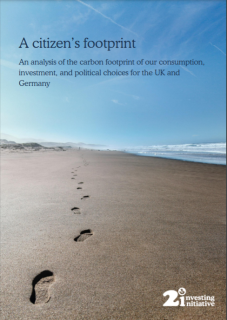
Footprinting the choices of individuals has a long track record in environmental accounting. To date, such footprinting has, however, largely been limited to citizen consumption choices, despite the fact that citizens serve many roles – as voters, investors and employees. While there are meaningful debates around the relative importance of each of these areas of a person’s life, there is limited to no analysis that ties these different strands together in one exercise.
This report is the first attempt known to compare the carbon footprint of an individual across their voting, investment and consumption choices. The analysis focuses on the average person in the United Kingdom and Germany as two case studies for the analysis. The key findings can be summarized as follows:
- Individuals will have the biggest impact on their carbon footprint through voting for climate-friendly political parties in the United Kingdom and Germany (~7,000 kgs of CO2/year). This is largely a result of the fact that the political impact for the whole country is allocated to the voters who delivered the political outcome.
- The average person will have the second biggest impact on their carbon footprint through changes in consumption, specifically in terms of travel (electric vehicles, rail), electricity and diet. However, the relationship between an individual’s consumption and investment footprint is highly dependent on a person’s savings and investment profile.
- The footprint analysis does not consider "effort levels". In the case of voting, the primary effort is with the government implementing its manifesto and the individual usually only votes every 4-5 years. In the case of lifestyle changes, these can be associated with high degrees of effort (e.g. changing diets)
